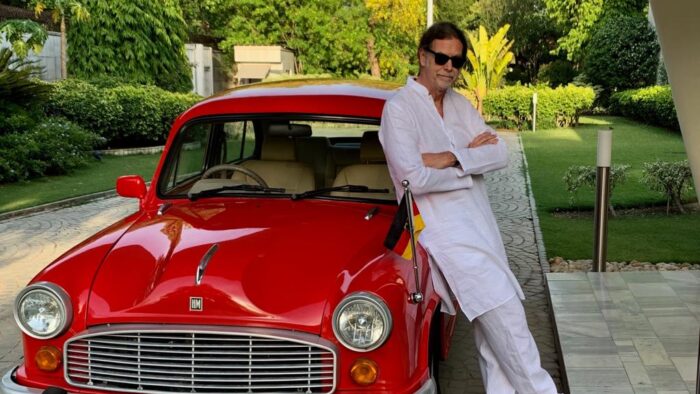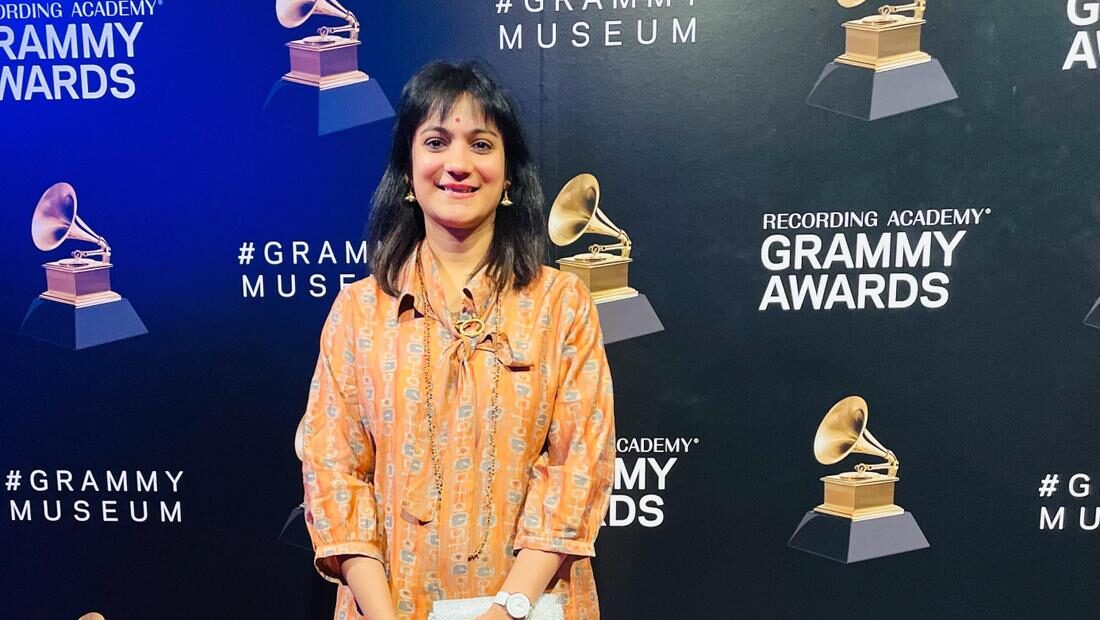Walter J Lindner has occupied the highest echelon of diplomatic service as Foreign Secretary of Germany by just being himself - a ponytail sporting musician with an uncommon view of the world. Having read Herman Hesse’s Siddhartha as a teenager, he became a seeker of the true meaning of life.
His fascination for India brought him here once as a backpacker in the 1970s and now as the Ambassador of Germany to India. He can be easily identified in the elite diplomatic streets of New Delhi riding around in his vehicle of choice - an Ambassador named Ambi Aunty.
Ambi Aunty got a new lease of life, when Walter arrived in India and found her in the garage. He got her painted red and presented his credentials to the President of India, with a flag fitted in front. “I have to be nice to her, otherwise she won’t take me places,” he says with a smile.
Born in Munich in 1956, Walter witnessed the coming down of the Berlin wall in 1989 in the very first year of his diplomatic career when he was Attaché in the Legal Directorate-General at the Federal Foreign Office, Bonn. The coming down of the Wall was an event that changed the modern world in a significant way. The music for that momentous occasion was Winds of Change by the iconic German rock band Scorpions, ushering a new world order - less hegemonic, more equal. The band played the same timeless song at a concert in Bangalore’s Palace Grounds in the 1990s, which this author attended as a die-hard Scorpions fan.
It is not surprising that Walter chose this song to commemorate 30 years of Indo-German relations this August, bringing together Indian musicians as he strummed his guitar. Says Walter, “Even today, this song is one of human hope. If you take it from the fall of the Berlin Wall and transfer it to today’s context, we thank God that this confrontation is gone. It is a relief that the Cold War is over. Today, as we battle Covid, every individual has their own worries and fears, and this song gives some hope - that if the Wall can come down, this situation too can get better.”

Walter is something of an anomaly in the diplomatic arena. He is a classically trained musician who picked up his grooves at Munich, Graz and Boston. He is also a lawyer by profession. Asked if it is his musical background which makes him sensitive to the other, he talks endearingly about the Indian ethos of ‘samskara’. “I think it is a part your DNA, when you're born. You know this better than we do in the West, but then it's also your upbringing. I grew up in modest surroundings and not in a protective environment.”
Walter worked first as a musician, but also as a taxi and truck driver and also at McDonalds to keep afloat, until he became a diplomat and had a chance to see how the other side of the world lived. “I traveled to so many countries on this planet and I saw how privileged we are in the West to live this life and we're still complaining about our situation.”
The attraction which began with the reading of Siddhartha was representative of the fascination that India’s deep philosophical approaches held to many of his generation. With his entry into the diplomatic service, “the interest in strategic partnership and economic and political ties with India followed. Yet, I think that a lot of Indo-German relations have to do with culture and it is also culture that comes to one’s mind when many Germans think of India.”
Walter’s first trip to India as a backpacker was in 1976 when he travelled over land taking six months coming through Turkey, Afghanistan, Pakistan and down the Khyber Pass. A journey made by many a European curious about India.
Of his first impressions of India before coming here, Walter says they were a bit ‘naive’. “ I expected everyone to be sitting under a banyan tree, meditating. The bus I came in was very dusty and filled with people and the weather was hot, and I was used to driving in nice air conditioned cars. Then you have a situation where you stop on the road for four hours because there's a cow and nobody moves the cow. And you wait there, sweating…because this is India’s reality.”
The ‘simplistic’ image of India turned to a culture shock initially, and then to a new reality. “It's like a rose. You have all these spikes and thorns. You have to open up, and put away all the smells, the heat and the noise, and you find this beautiful rose inside. The beauty is always there but you have to first unravel all the layers. So it takes some time and some openness to know India.”
Walter invested time and effort, travelling around India for four years, instead of the typical jet-setting one-week-exotic-holiday to India that some visitors prefer.

“To really really experience this country you will have to stay with people here month after month. It takes some time to adapt. I went through this cycle of observing the negative aspects of crowding, etc before getting to the India that I love so much, which is deeply spiritual. There is so much beauty in this country.”
As a diplomat, Walter has not spared any effort to know what makes India tick. He has met grassroots people, farmers, artists, away from the cocktail circuits that most diplomats inhabit. He even visited the RSS headquarters at Nagpur, to know the truth about an organisation that invites, in equal measure, both awe and flak. “Since humans are not perfect there's no paradise on this planet. For me the ideal India is that she is a country of variety, of tolerance, of coexistence, not minding what your neighbor believes in. You just exist together. It is the softness and non-violence incorporated by Mahatma Gandhi. But it has been a part of India all the time, and the fact is that Hinduism never induced anyone to occupy any other country,” says Walter with feeling.
There are negative aspects to every country, including India, but there also a lot of positive ones. “I guess the fair way of treating this is to not neglect this but to put it in context and try and see what's the real India, and that's one of my jobs as Ambassador. I try to be neutral and come with a positive attitude and even if there are things to be criticized, you do it in a way which is not condemning.”
India for Walter needs to be taken in slowly because “she is like right between the eyes. There’s no sugarcoating it. It’s totally intense. The beauty is intense, so also the tolerance. The beauty of the landscape, the openness of the people, the architectural beauties, the music… I discover everyday new things and you have to be here 50 years to really understand India, I guess, because it's a complex country.”
MUSIC
Not satisfied being uni-dimensional, Walter experimented with music as he did with everything else. After learning Western classical music, he tried to discover modern music to become a rock and jazz musician. He was open to other influences while in Latin America, Africa and Britain to finally come to Indian music.
“Music wise, India is pretty different from the rest of the world. Be it the instruments, the harmonies, the way you structure your pieces of music - the ragas, which is very different for a normal European musician. This is a challenge, so you have to be prepared to get into it. It’s not enough to say, ‘I now have the technical skills to play a sitar’. Its everything from the way you enter the stage, and kiss the ground, the way you talk to your fellow musicians, the way you dress, the way you sit, the way you tune your instrument… until you get into this mode. Now that is a lot of philosophical attachment.”
It’s not the same, he says, as jamming with a group of musicians in New York at the count of three. “ The way we start in India is different. For this you need patience, dedication and devotion. I'm very interested to work more closely with Indian classical musicians, because I want to discover more of their world.”
He is in talks with Hindustani musician Rakesh Chaurasia, who collaborates with musicians of the West. “Rakesh is crossing over to Western music but then always comes back to Mumbai and his family. It’s not like the Beatles coming to India or even Ravi Shankar who played the Sitar but in a way which was westernized. What we need right now is a combination which is tasteful and which has a lot of respect for the music of both sides.”
Winds of Change, desi style: https://t.co/x3u4GQW2nO?amp=1
So how does being an artist shape the way he looks at diplomacy. “If I was a dancer, or a painter or a poet, it would be the same. It gives you a different angle, a new perspective. One’s life is not limited to just earning money, which I do with diplomacy. As an individual, you wake up and have your thoughts and your spirit and your soul. So you need to take care of all of these aspects.”
Artistes have a way of communicating, of engaging audiences, which gives an edge in diplomacy. “It gives one a lot of self-assurance. I can relate to people more. That's why I said in an interview the other day, that in 2020 we need a new kind of diplomacy. You have to relate to people, create sympathy. In this case, for Germany, I should make people think, Germans are pretty cool guys because they are listening and they are interesting.”

When Chancellor Angela Merkel visited India in 2019, Walter drove with her from the airport to his residence in New Delhi. It was a half an hours drive and her first question to him was ‘what did he like about India’. “If I was just a cocktail diplomat, I would only be able to tell her what my other colleagues say. But I want to talk about the fuller, richer India, about the nurse, the Bollywood actor, the farmer so that people get a more complete picture. If you are a one trick pony, it can be a bit limiting in whatever profession you may be.”
Indian influence in Germany
Germany is an attractive destination for companies, students and even immigrants. There are currently around 25,000 Indian students studying in Germany, which is the highest number of all European countries. It is even much more than in the UK, which most would assume is the preferred destination because of the language.
Walter says there are now many classes offered in Germany in English, besides fees being highly subsidised.
There are also the restaurants, the temples and yoga centers. “So, India has a very good connotation in peoples' minds in Germany. The landscape, the beauty, the profound philosophy combining body and soul - it's all there. People at large see a country with over 7,000 years of tradition, so this is quite a history of culture.”
India and Germany have a certain kind of closeness, says Walter, a closeness between two souls, beyond all the cultural and geographical distance. “We are both serious, no-nonsense, deep running thinkers. There's an understanding, which means maybe some of your brain cells work exactly like ours in the same cultural and spiritual ways.”
(Cover pic: Ambassador Walter J Lindner with Ambi Aunty)





